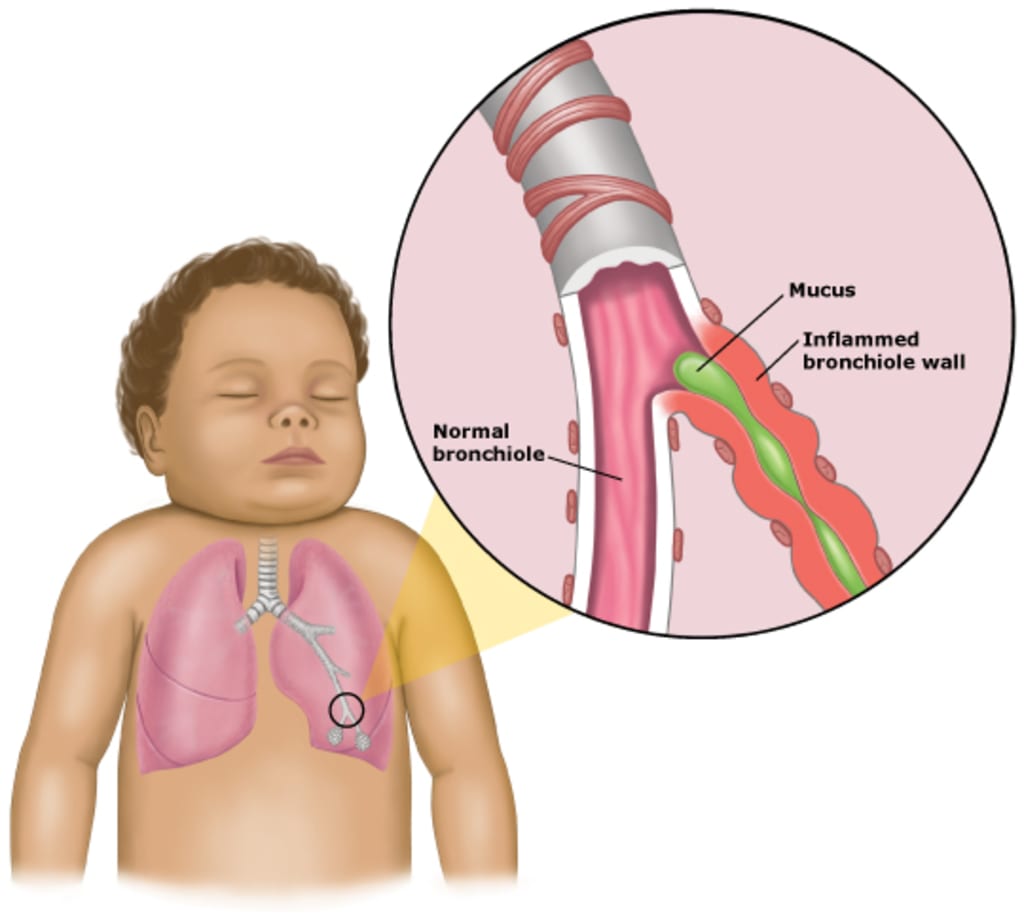"Respiratory Syncytial Virus (RSV) Infection: Prevention, Natural Remedies, and Management"
"Understanding RSV, Effective Preventive Measures, and Natural Supportive Care for Symptomatic Relief"

Respiratory Syncytial Virus (RSV) infection is a common respiratory illness that affects people of all ages, particularly infants and young children. RSV belongs to the Paramyxoviridae family and is a single-stranded RNA virus. It primarily targets the respiratory tract, causing symptoms ranging from mild cold-like symptoms to severe lower respiratory tract infections, such as bronchiolitis and pneumonia.
Transmission of RSV occurs through respiratory droplets when an infected person coughs or sneezes. The virus can also survive on surfaces for several hours, making it easy to spread in crowded environments like schools and daycare centers.
Symptoms of RSV infection often appear within 4 to 6 days after exposure. They include:
1. Coughing
2. Sneezing
3. Runny or stuffy nose
4. Fever
5. Sore throat
6. Mild headache
7. Wheezing (in some cases)
8. Decreased appetite (in infants)
In healthy individuals, RSV infection usually resolves on its own without the need for specific treatment. However, in vulnerable populations like infants, the elderly, and those with weakened immune systems, RSV can lead to severe complications. Bronchiolitis, an inflammation of the small airways in the lungs, is a common complication in young children. Severe cases may require hospitalization and supportive care, including oxygen therapy.
Prevention is crucial to minimize the spread of RSV. Some preventive measures include:
1. Frequent handwashing with soap and water
2. Avoiding close contact with individuals showing symptoms of respiratory illness
3. Disinfecting frequently-touched surfaces
4. Covering coughs and sneezes with a tissue or elbow
5. Avoiding large gatherings during peak RSV season (usually fall to spring)
Vaccines for RSV are still in development, and research is ongoing to find effective ways to prevent severe infections in vulnerable populations. Palivizumab, a monoclonal antibody, is sometimes used to provide temporary protection to high-risk infants during the RSV season.
Respiratory Syncytial Virus is a common respiratory infection that affects individuals of all ages. While most cases result in mild symptoms and resolve on their own, severe complications can arise, especially in vulnerable populations. Taking preventive measures is crucial in reducing the spread of RSV and protecting those at higher risk of severe infection.
1. Seasonality:
RSV infections tend to follow a seasonal pattern in temperate climates, with most cases occurring during the fall, winter, and early spring months. However, in tropical regions, RSV infections can occur throughout the year.
2. Impact on Infants and Children:
RSV is a leading cause of respiratory illness in infants and young children worldwide. It is estimated that almost all children will have been infected with RSV at least once by the age of 2. In some cases, the infection can lead to more severe respiratory problems, and premature infants or those with underlying health conditions are particularly at risk.
3. Impact on the Elderly and Immunocompromised:
While RSV primarily affects young children, it can also pose a significant threat to older adults and people with compromised immune systems. In these populations, RSV can lead to pneumonia and exacerbate existing respiratory conditions, potentially leading to hospitalization.
4. Diagnosis:
RSV infection is often diagnosed based on clinical symptoms and the patient's medical history. In some cases, doctors may order tests like nasal swabs or throat swabs to detect the virus's genetic material or antigen in respiratory secretions.
5. Treatment:
Currently, there is no specific antiviral medication for RSV. Treatment is generally supportive and aims to alleviate symptoms. Over-the-counter fever reducers and pain relievers may be used to manage fever and discomfort. In severe cases, hospitalization may be necessary for close monitoring and supportive care, including oxygen therapy and hydration.
6. Research and Vaccines:
Scientists continue to research and develop vaccines for RSV. Vaccine development has been challenging due to the virus's complex structure and the need to ensure safety, especially in the very young and elderly populations. Several vaccine candidates are in various stages of clinical trials, offering hope for future prevention strategies.
7. Hygiene Practices:
Practicing good hygiene is essential in preventing RSV transmission. Regular handwashing, especially before touching the face or caring for infants, can reduce the risk of infection. Parents and caregivers should also refrain from exposing young infants to crowded places during peak RSV seasons.
8. Similarity to COVID-19:
Some symptoms of RSV infection, such as coughing, fever, and difficulty breathing, can resemble those of COVID-19. During the COVID-19 pandemic, healthcare providers must consider RSV as part of the differential diagnosis, especially in pediatric cases.
Respiratory Syncytial Virus infection is a significant respiratory illness affecting individuals of all ages, with infants, young children, the elderly, and immunocompromised individuals being particularly vulnerable to severe outcomes. While no specific antiviral treatment is available, supportive care can help manage symptoms. Ongoing research for vaccines and preventive measures remains critical in controlling the spread and impact of RSV infections.
Prevention and natural remedies play essential roles in managing Respiratory Syncytial Virus (RSV) infection. Here are some preventive measures and natural remedies that can help reduce the risk of infection and ease symptoms:
Prevention:
1.Hand Hygiene:
Regularly wash hands with soap and water for at least 20 seconds, especially after being in public places, using the restroom, or coughing/sneezing. If soap and water are unavailable, use an alcohol-based hand sanitizer with at least 60% alcohol.
2. Avoid Close Contact:
Limit contact with individuals who have respiratory symptoms, and avoid close contact with infants, especially during RSV season.
3. Cover Coughs and Sneezes:
Always cover your mouth and nose with a tissue or your elbow when coughing or sneezing to prevent the spread of respiratory droplets.
4. Disinfect Surfaces:
Regularly clean and disinfect frequently-touched surfaces, such as doorknobs, light switches, and electronic devices, to reduce the risk of contamination.
5. Stay Home When Sick:
If you have symptoms of a respiratory infection, it's best to stay home and avoid contact with others to prevent the spread of the virus.
6. Proper Ventilation:
Ensure proper ventilation in indoor spaces to reduce the concentration of respiratory droplets in the air.
Natural Remedies:
1. Hydration:
Drink plenty of fluids, such as water, clear soups, and warm herbal teas, to stay hydrated and help thin mucus secretions.
2. Steam Inhalation:
Inhaling warm, moist air from a bowl of hot water or a steamy shower can help relieve congestion and soothe irritated airways.
3. Humidifier:
Use a humidifier in your living spaces, especially in bedrooms, to maintain optimal humidity levels and prevent dry air, which can exacerbate respiratory symptoms.
4. Honey:
For children over the age of one year, honey can be an effective natural cough suppressant. Mix honey with warm water or herbal tea and consume it before bedtime.
5. Ginger and Turmeric:
Both ginger and turmeric have anti-inflammatory properties that may help soothe respiratory inflammation. Consider adding these spices to meals or preparing a warm ginger or turmeric tea.
6. Eucalyptus Oil:
Inhalation of eucalyptus oil vapor can help open up the airways and alleviate respiratory congestion. Use a few drops in a diffuser or add to hot water for steam inhalation.
7. Rest:
Get plenty of rest to support your immune system's ability to fight off infections and promote faster recovery.
Important Note:
While natural remedies can be beneficial in managing symptoms, it's essential to consult with a healthcare professional, especially when dealing with infants, young children, the elderly, or individuals with underlying health conditions. Severe cases of RSV require medical attention, and supportive care in a healthcare setting may be necessary. Always follow the advice and treatment prescribed by healthcare providers for the best outcomes.
About the Creator
Go With Trend
"Express, Connect, Impact - Welcome to "Go With Trend"!
Discover the magic of Letters on our vibrant platform. 🎙️ Share stories, sing your heart out, and connect with a global audience. 🌍 Unleash your creativity today! ✨ #"Go With Trend"






Comments
There are no comments for this story
Be the first to respond and start the conversation.